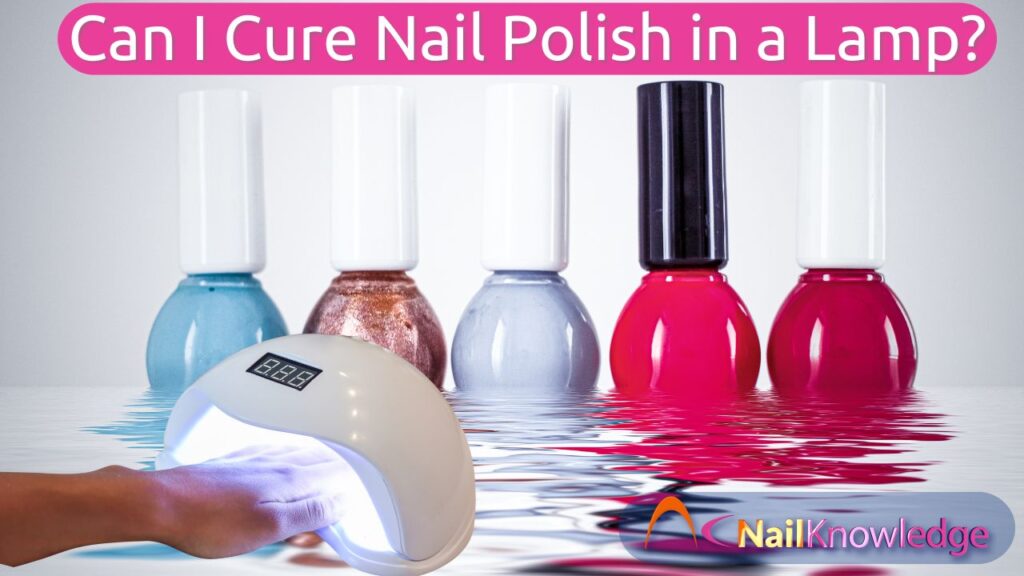Nail enthusiasts often wonder, “Can I cure regular nail polish in a UV/LED lamp?”
The short answer is no, but the long answer requires a deeper dive into why this is not an ideal practice. While gel polishes are designed specifically for UV/LED curing, traditional nail polish is formulated differently. Let’s explore this topic in detail, covering the science, risks, and alternatives.
What Is the Difference Between Regular Nail Polish and Gel Polish?
Before understanding if you can cure nail polish in a lamp, it’s important to grasp the fundamental difference between regular nail polish and gel polish.
- Traditional Nail Polish: This air-drying polish relies on solvent evaporation to harden. It contains no ingredients that react to UV/LED light.
- Gel Polish: This is a special formula designed to cure under UV or LED light. Gel polish contains photoinitiators that activate under light exposure, causing the polish to harden almost instantly.
Traditional nail polish simply doesn’t have the chemical components necessary to benefit from UV/LED exposure. Trying to use a lamp with traditional polish is merely a fruitless exercise. Some UV/LED lamps emit warmth/heat that may support the evaporation of the polish solvents to a small degree or this method may be used to keep a client with a fidgety hand to remain still, but either way does not assist the overall drying of the polish.
Can You Put Regular Nail Polish in a UV/LED Lamp?
Technically, you can place traditional nail polish in a UV/LED lamp, but it will not cure it properly. Traditional polish needs air to gradually evaporate its solvents, and a UV/LED lamp would only speed up the solvents evaporating if the lamp is emitting any warmth. This may create a superficial drying effect on the top layer of polish, leaving the bottom layers wet and soft.
If the base layers aren’t dry, this can lead to:
- Smudging
- Uneven texture
- Short-lived manicures
What Are the Risks of Using a UV/LED Lamp on Regular Nail Polish?
Using a UV/LED lamp with regular nail polish isn’t just ineffective; it can also come with risks.
- Prolonged Drying Times
Instead of speeding up the drying process, UV/LED exposure might leave your polish tacky for longer, as it interrupts the natural evaporation process. - Discoloration or Degradation
Regular polishes are not designed for UV exposure and may break down or change colour when subjected to UV/LED light. - Damaging Your Lamp
Over time, using traditional nail polish in a lamp simply is a waste of the lamp’s working hours, which is best saved for the gel products it was designed for.
Why Do Some Professionals Use Traditional Polish with UV/LED Lamps?
You may have seen nail technicians applying traditional nail polish with UV/LED lamps and wonder how they make it work. The trick lies in the technique.
Some professionals use a “gel sandwich” method, where they:
- Apply a gel base coat and cure it.
- Add a thin layer of regular nail polish and let it air-dry fully (Which takes time).
- Seal with a gel top coat and cure.
This method allows for the use of regular colours, however, it’s important to note that the regular polish must be completely dry before applying gel layers. Even light dampness can cause bubbling, peeling, or lifting, it is certainly not a fully trusted method. It is always best practice to use products according to the manufacturer’s instructions vs playing chemist with professional products.
What Is the Best Alternative to Curing Regular Nail Polish?
If you want the benefits of a UV/LED manicure while using traditional polish, there are safer and more effective methods:
- Hybrid Polishes
Some brands offer hybrid nail polishes designed for UV/LED curing. These products combine the thinner, swifter removal, and flexibility experienced with regular polish with the durability of gel. - Quick-Dry Top Coats & sprays
If you’re looking to speed up drying times, a quick-dry top coat for traditional polish is a better option than using a UV/LED lamp. Also available are quick dry drops or sprays which speed up the evaporation of the solvents within the polish. - Application Methods
Get the best results and fast dry times by elevating your application methods. Ensure the nail is clean and dry, ready for the polish to be applied, applying in multiple thin layers, allowing each layer to almost dry, preventing any postman blunders.
What Happens If You Use the Wrong Product in a UV/LED Lamp?
If you use a product not designed for UV/LED curing in a lamp, several things can go wrong:
- Incomplete Curing: The polish may remain soft or sticky, resulting in smudging.
- Bubbling or Lifting: Improper curing can cause air pockets that weaken the manicure.
- Wasted Time: You won’t achieve the long-lasting, glossy finish you expect from gel polishes.
Final Verdict: Can You Cure Nail Polish in a Lamp?
While it’s tempting to use a UV/LED lamp for regular nail polish, the results won’t be what you’re hoping for. Traditional polishes are not designed for curing under UV/LED light, and attempting to do so can lead to disappointing results and potential risks.
If you’re looking for the durability and shine of gel nails, it’s best to stick with products formulated for UV/LED curing. Alternatively, use hybrid polishes to combine the best of both worlds.
For a flawless manicure, the right tools and products make all the difference. Now you know the science and risks behind curing regular nail polish in a UV/LED lamp—so you can make the best choice for your nails!


